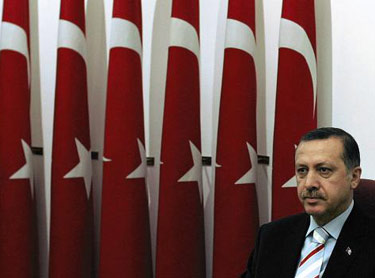
Turkish Prime Minister Recep Tayyip Erdogan Source: Google Images
Sovereign risk in Turkey was once talked about in the same breath as Brazil’s. Not so anymore. One is going hat in hand to the IMF, likely to get $45 billion in the coming weeks; the other is largely self-financing. What went wrong in Turkey? Always keep your eye on the current account deficit, folks, even when Wall St. analysts tell you its nothing to worry about because it’s financed by FDI, or some such Bernanke-esque bunk. Current account deficits mean borrowing from abroad. And that means vulnerability. Turkey went into the global crisis with a 5-6% current account deficit, while Brazil went in with small surpluses. Keep your eye on America as well and its sovereign credit risk — current account deficits there have been nearly halved to 2-3% from 5-7% a couple of years ago, largely due to the US recession. But the U.S. still can’t kick its foreign borrowing habit, Obama’s protectionism notwithstanding. Likewise, watch out for “twin deficits.” That’s when government deficits move in tandem with current account deficits (the former often driving the latter). The US has these, as does Turkey (where government deficits are in the range of 5-7% of GDP, versus Brazil’s 3-4%). Turkey’s overall government debt burden remains modest at under 50%, versus Brazil’s near-70%; however, Brazil’s government debt burden is headed down, while Turkey’s is rising. Hence, Fitch moved Brazil up to investment grade not long ago, while Turkey languishes at BB-. They both were BB- only a few years ago. Sometimes the rating agencies get it right, even though it often takes them some time to do so.
So, the Turkish prime minister shows up hat in hand at the IMF’s doorstep, while President Lula’s Brazil is considered a rising power. Have a look below at the CreditSuisse report from today on Turkey’s negotiations with the IMF. Deputy Prime Minister Babacan, whom I met with in the past and perceive as smart and wily, is thankfully in charge of these negotations.
From CreditSuisse:
Turkey
Berna Bayazitoglu
+44 20 7883 3431
[email protected]
Prime Minister Erdogan denounced yesterday the claims in the local media that the IMF has offered a sizable financing package to the Turkish government which it cannot turn down. As we reported in the Emerging Markets Economics Daily yesterday, Erdogan told the Wall Street Journal on Monday (5 October) that the Turkish government has resolved one of the sticking points with the IMF, namely the IMF’s request for an independent tax revenue administration, and added that “he would like to see a new IMF program for Turkey agreed soon.” This was the most upbeat assessment that Erdogan has offered on the subject in a long while. Looking for an explanation for the change in Erdogan’s tone about an IMF agreement, the Turkish media claimed yesterday morning that the IMF might have offered a large financing package to Turkey (amounting to $45bn) which Erdogan cannot turn down. However, at a reception later in the day, Erdogan denounced local media stories that the IMF has made a new offer to Turkey.
Nevertheless, Erdogan’s statements in the Wall Street Journal add strength to the possibility that the government might invite an IMF mission to Turkey soon. As we noted in the Emerging Markets Economics Daily yesterday, speaking at various conferences in the last few days at the IMF/World Bank annual meetings in Istanbul and somewhat in contradiction to Erdogan’s statements in the Wall Street Journal, Deputy Prime Minister Babacan (who is the senior policymaker in charge of policy discussions with the IMF) had said that the discussions on the tax revenue administration and local governments’ spending were still continuing and that the IMF was studying the government’s medium-term economic plan and fiscal program.
The Statistics Office will release the industrial production data for August tomorrow. We forecast that industrial production was down 4.7% yoy in August, slowing from a contraction of 9.1% yoy in July. Our forecast is more optimistic than the consensus forecast (according to Bloomberg) of a 5.2% yoy contraction.